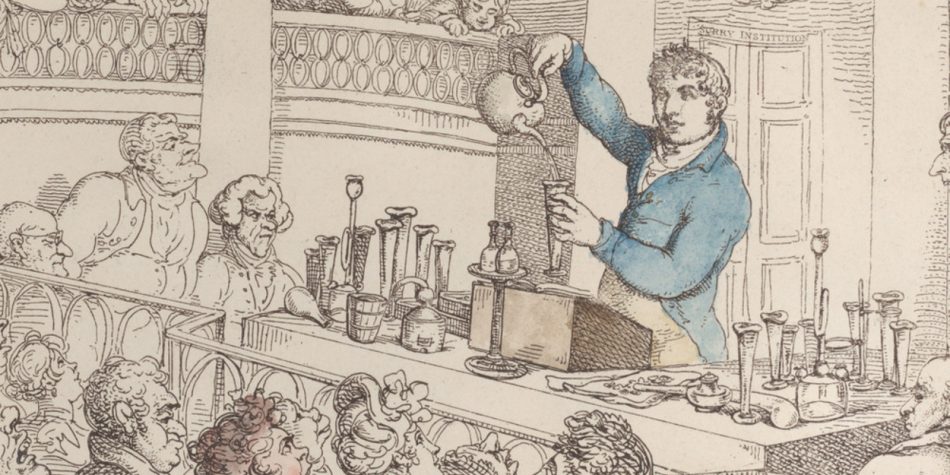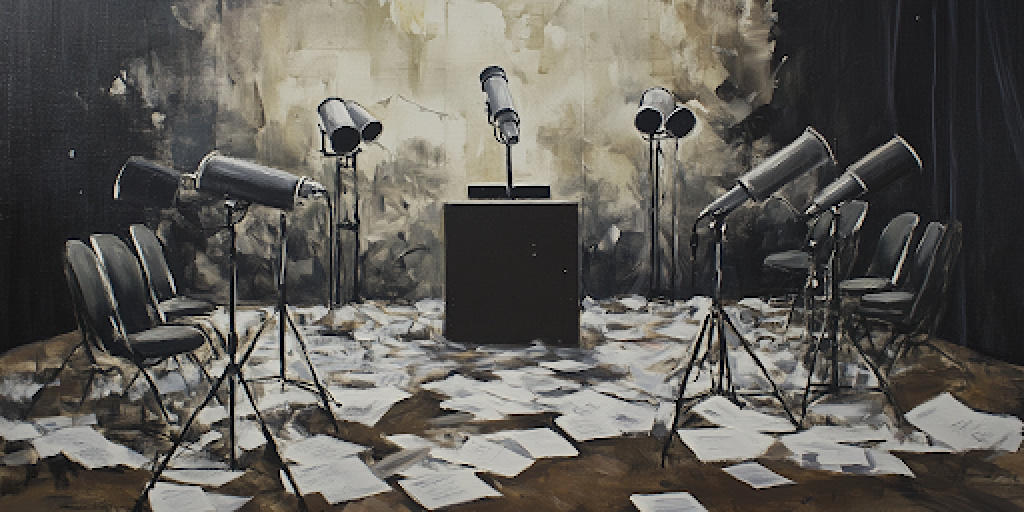What is expressed here, I should note, is influenced by a deeply meaningful experience I had as a young man. Within a period of about 18 months or so, I read Orwell’s 1984, and Animal Farm, Huxley’s Brave New World, Bradbury’s Fahrenheit 451, and topped it off with a viewing of Pasternak’s Dr. Zhivago. I can honestly say that my life has never been the same.
Perhaps like many people I have used the term “acid test” countless times without ever understanding the origin of the phrase. I knew what the phrase meant—an absolute or crucial test of something that reveals once and for all the true nature or truth of something. When I finally looked up its origins I found out that it referred to a chemical test applied to ore samples based on the fact that nitric acid dissolves other metals faster than it dissolves gold. So as the other metals dissolve, the amount of gold in a sample becomes clearer and so does, therefore, the value of the ore.
It turns out that the literal meaning of “acid test” is more applicable and more telling about the current state of our culture, our republic, and our society than I had understood. The image it affords for understanding current events and current rhetoric about them is instructive. I am speaking here, of course, of the recent and continuing accusations and turmoil aimed at “systemic racism,” precipitated by a particular immoral act perpetrated on a black man by four police officers. Justifiable moral outrage focused on the immorality of that act was soon eclipsed, absorbed, and co-opted into anger and outrage directed at a “systemic racism” in our nation, our history, and beyond political or national borders. It was deployed against privilege, and all people who are assigned, for whatever reason, to that privileged class. This larger class distinction cleaves along racial lines. The slogan that provides cohesion and energy to this movement is, of course, “Black Lives Matter.” The single word that dismisses all opposition, and quells any sustained discussion is “privilege.”
Here comes the confession. When the cultural explosion happened, following the death of George Floyd, I experienced my own outrage at the immorality of the incident, and my deep disappointment regarding our humanity and our seeming inability to respect human life and human dignity. I very much want that immoral act dealt with as the laws and moral ideals of our society require. As the aftermath of the incident unfolded, I had another deeply poignant and disturbing reaction—one that took me to the philosophical and intellectual level at which the barbaric assault was being portrayed, interpreted, and understood. There was something deeply wrong, deeply dangerous, and deeply threatening going on and it had nothing to do with the superficial constructs of my white privilege or lack of “wokeness.”
On the contrary: it was that a deeply disturbing act of real human barbarity was being co-opted into a discourse, a world view, a political mindset, that stripped it of its reality, its urgency, and its humanity. I was thrust into, almost condemned, to understand what had happened in a world I knew to be false and misleading, and de-humanizing. I knew this conceptual world. I had experienced it and deeply felt it as articulated by Orwell, Huxley, and Bradbury. In this context I felt I had to understand what is happening in our society at the level of ideas and their consequences because the co-opting discourse of the media and the protest movement required me to understand and articulate at a philosophical level; the level at which societies and nations are created and maintained; at which ethical laws and civic virtues are articulated and practiced; and just societies founded on equality, liberty, morality, and responsibility are built and sustained. This is serious business.
I saw political activism and global social theory overcome and displace morality, human decency, and moral agency
My reaction was deeply affected also by my having lived through the “long hot summer” of 1964, the perhaps longer and hotter summer of 1967, and the equally devastating assassinations of 1968, all during a very unpopular foreign war, and a constant threat of “mutual assured destruction,” from an omnipresent Communist bloc of nations. All of these things ran together; that much was clear. But as a teenager I was not prepared to make sense of them. They did, however, reinforce my view of the dystopia I had been reading about.
Fast forward to 2020. As the news of the killing of George Floyd broke, and protests began, I was saddened and troubled by the death and the failure of current laws and practices to have done their jobs and protected a human life that should have been protected. Fairly quickly, however, I saw something else unfolding. I saw political activism and global social theory overcome and displace morality, human decency, and moral agency—all on center stage and in our media, and our public and private discourse. I saw a deliberate attempt, driven by global level political and social theories, to co-opt and exploit reasonable personal outrage and feelings of moral responsibility. And all this had a familiar form, and an origin I could trace quite easily.
I will mention only two tell-tale signs of the origin this movement—origins that have their roots far from 2020 Minneapolis both in space and time. First the slogan. The movement maintained the Black Lives Matter slogan introduced in 2003. It is a great slogan, short, micro-focused and infinitely defensible. One of its chief virtues is that it is a “show stopper.” It can easily short-circuit attempts to discuss deeper issues because any such attempts can be portrayed as claims that black lives do not matter. It is an effective way of shutting down conversation while simultaneously claiming that you are opening it up. The strength of the slogan has repeatedly shown itself in effective resistance to any discussions that would modify or add to the slogan, such as “All Lives Matter.”
If the current social movement were about the particular immoralities that surround us and are manifest in many settings, such changes to the slogan would only enhance the movement, but the resistance to modifications of the slogan suggests that political and philosophical ideology, not common and communal moral sensitivity, is driving the movement. My own suggestion for a modification of the slogan would be to ask whether we could also include “Unborn Lives Matter.” More than 862,000 innocent lives were purposefully ended in the year 2017 alone, of which more than one-third were black lives. If such a modification would be acceptable, then, perhaps, I could give my heart to the current political orthodoxy and its tightly controlled moral tenets.
My own generation invented a similarly effective slogan for carefully constraining political and moral discourse, “Make Love, Not War.” This was effective in shutting down discourse on two fronts. First, it defended the tenets and practices of the on-going sexual revolution, as in, “Don’t talk to me about sexual promiscuity while you are dropping napalm on innocent Vietnamese.” It also effectively shut down discourse about the Vietnam War without having to dirty oneself with discussions of political theory and issues of political and ideological freedom. Any discourse that was not explicitly and unconditionally against the war was obviously anti-love, and simply hateful. It worked pretty well for many. But some of us felt like we had no place in the conversation—or that there was no conversation. This seems to be true today as well.
The other tell-tale sign of the origin of the current social movement is how quickly and how smoothly the discourse shifted from the incident in Minneapolis or even a list of other specific incidents, all unique in their circumstances and the issues involved, to “Systemic Racism.” The first problem with this term is that it changes—by fiat—a word (racism) from a simple descriptive label in reference to a set of actions, problems, and attitudes, to a cause of such actions. It may be a subtle shift, but it is a monumental one. It is one thing to say that Smith’s action or even his attitude is “racist,” meaning it is unkind, hurtful and unfair and his target was chosen based on race. It is quite another thing, however, to hold that Smith’s actions were the product of “racism”—that there is such an abstract, immaterial thing that exists everywhere and nowhere and moves people to commit unfair, immoral, and unkind actions, and also moves them to resist change and even honest discourse about change.
This latter position—inherent in the term, “systemic racism,” is a philosophical proposition, not a moral one, and not a statement of simple fact. It is a metaphysical proposition, and it has a philosophical history, which I will turn to later. Systemic racism is not a term that would be developed and deployed by an ordinary citizen, a concerned protester, or even a neighborhood organizer. It is tied into a long and deep political and philosophical history. While the face of the current unrest is taken to be simple concern for individual acts of violence aimed at racial minorities, the soul of the unrest is Critical Theory, developed in European universities during the late 19th century through the 20th. It was imported into US universities during the 20th century, gaining general popularity, if not preeminence during the 1960s and 1970s. Its influence continues to grow, largely unchallenged, in American intellectual circles up to the present.
Critical Theory has its origin in the confluence of several intellectual streams—the grand (German) idealism of G.W. F. Hegel, Marxism (understood as a sort of “applied Hegelianism”), and neo-Marxisms of various stripes which came about largely (as a response) when the predicted world-wide proletariat revolution did not take place following WWI, and when the Soviet Union failed as such, and showed itself instead to be dystopic. Also influential in the formulation of critical theory was the continued development of positivism, descended from Auguste Comte and others, that invited empirical science to develop and maintain the final, authoritative say in human affairs as well as in understanding the physical world.
It will take power to accomplish the dismantling of these institutions and their elimination or absorption into a new cultural order
Critical Theory was incubated, nurtured, and matured largely at the Frankfurt School, associated with the Institute for Social Research at Geothe University in Frankfurt Germany following WW II (the school had spent the war years at Columbia University in New York). The “critical theory” that was a hallmark of the Frankfurt School was a descriptive term suggesting not so much objective critical examination and debate, but rather the species of specific critical dismantling of established institutions along the lines of neo-Marxist critique. Critical theory brings together natural sciences and social sciences, along with the arts and humanities, deploying them in a project of broad cultural criticism and deconstruction of potentially any or all aspects of culture, the whole aimed at “emancipation” of humanity from whatever constraints are imposed by current political theories, ideas, and cultural institutions.
All social sciences thus become pragmatic and applied, having a chiefly socio-political purpose. The social sciences are thus liberated from having to deal with the essential but difficult metaphysical, epistemological, and moral issues they have traditionally had to address as the foundation for their subject matter. Rather they are conscripted into, and charged with, cultural critique, and obliged to further the neo-Marxist, neo-Hegelian agenda of emancipation from contemporary social, political, economic, moral, familial, and religious institutions. Such an endowment of relevance is heady stuff for social scientists.
Of course, it will take power to accomplish the dismantling of these institutions and their elimination or absorption into a new cultural order. For this reason, power analyses of various sorts have been part of critical theory approaches to social science for at least the last four or five decades. Critical theory approaches to building an emancipated society decry power and its use while simultaneously assuming power and investing it in a new intelligentsia and in its socio-political agendas.
Power is required to overthrow extant oppressive cultural institutions and assure sufficient control to prevent any vestiges from regaining vitality. Knowledge, real knowledge, is understanding everything from the perspective of, and in the socio-political philosophical terms critical theory makes available—i.e., in terms of the struggle between the repressive, controlling, evil ideas and structures of the past and present identified by critical theorists as “systemic” in current culture on the one hand, and the neo-Marxist understandings and constructs that must replace them in the interest of emancipation on the other.
In common parlance, only “woke” knowledge counts as “knowledge.” It is here that we come back to the acid test facing America—one that is, in a sense, the opposite of that acid test applied to metal ores. Rather than less important elements of our culture being challenged with dissolution, our impending “acid test” is whether our culture—and even our souls—can survive the caustic, acidic effects of abstractions and counter abstractions, concocted and endowed with power by an influential intelligentsia, giving them the ability to fundamentally alter and even to dissolve the moral fiber and meaning of human life itself.
American philosopher and scientist, Daniel Dennett (b. 1942), in Darwin’s Dangerous Idea (1995), offered an analogy that provides insight into our current tribulations while shedding light on the Critical Theory agenda. Dennett (by no means a critic of Critical Theory) suggested that Darwinianism could be considered as a sort of intellectual “universal acid.” A universal acid, of course, eats through literally all material substances. Darwinianism, as a conceptual universal acid, likewise eats its way through all ideas, cultural practices, understandings, relationships, and institutions, and leaves them, in the end (after it has done its work), recognizable in a way, but fundamentally and forever altered—never the same again. Darwinianism and Marxism are two of those powerful abstract “-isms” (which Critical Theorists are so skilled at “discovering”) that have been invoked and adopted as explanations for virtually all human endeavors, institutions, and meanings.
These and other such “-isms” constitute comprehensive world views—lenses through which all else is to be interpreted and understood. Such “-isms” are always taken to be genuinely “systemic.” Thus, racism is deemed to be systemic in America in the present day by those enlightened (knowingly or not) by critical theory, and by current events. Darwin and Marx (after whom two rather pervasive “-isms” are named) were contemporaries, aware of each others’ work, and we might even suggest they were vulnerable to a common zeitgeist. Leaving aside any consideration of the nature, role, and effect of Darwinianism on theories and understandings in the life sciences, let us look at its “acidic” effect on the human social and moral world.
A few examples will suffice to show how Darwinianism eats through everything and leaves it recognizable but fundamentally altered. For instance, if we grant the tenets of Darwinianism, we can still have acts of “altruism” and “self-sacrifice,” but we also know, in the back (or even the front) of our minds, that they are really the product of a drive to gain reproductive advantage for oneself and others like oneself—hardly something that can merit moral praise. We can still have childbearing and family life, but always, behind that bundle of joy, is a mark of reproductive success engineered for us (systemically) by the chemical molecules inside the nuclei of our own cells, and all Dad’s (or Mom’s) hopes and expectations bear the inevitable mark and color of inherently selfish gene promulgation.
We can still have religion, but at the end of the day, we understand that religion has persisted because it enhances survival value. Thus, treating each other in ways that “religion” prescribes pays off in reproductive success (at least in some varieties of religious practice—the ones that have survived) and getting children to the age of fertility, and making them, in turn, desirable mates. We can still have standards of sexual morality, but people of faith will necessarily be forever puzzled about why our God should require of us a sexual morality that is so contradictory of our grand biological imperative.
And finally, we can still recognize and appreciate an atoning Savior—but we wonder why we would need one if we are following a cosmic biological mandate that seems to contradict the moral code to which atonement is indexed—not only in sexual matters but also in matters of survival and reproductive advantage. Much creative storytelling is required to make this work, but, even after a century or so there is no settled account that does not leave religion and atonement fundamentally altered and “hollowed out.”
Marxism, perhaps the chief cosmic “-ism” underlying all of the others that have arisen in academia and spread through western culture in recent decades (albeit in its “neo-Marxist” forms), also eats is way through everything and leaves it fundamentally altered. The classical Marxist attack on religion is widely known: “Religion is the . . . opium of the people.” In any Marxist system, we can have our religion and derive from it the comfort it is intended to provide. But to be thus comforted is, in neo-Marxist terms, rightly understood as a species of what is known as “false consciousness.” Religion is one of the means by which those who control wealth keep the laboring classes docile and grateful for what they have and hoping that in a “next life” things will be more equal. So, religion is a weapon formed against the powerless by the powerful and used to maintain power.
For all critical theory-informed positions the safest and most congenial and convenient religion—especially Christian religion—will be dominated by what has come to be called the “social gospel” wherein Christ is the harbinger of neo-Marxist emancipation-salvation. Any and all power analyses like those given here will leave whatever they are applied to fundamentally altered. We can still have conjugal families, but under the realization that such a family configuration has been and still is a tool of the powerful and wealthy to rear the next generation of workers in a way that they can be educated into their subordinate place in the social power structure at the expense of their compliant parents. We can still recognize and experience conjugality and sexuality, but it too is ultimately indexed to the production of a generation of workers, and to keeping husbands and fathers suitably engaged.
Sexuality is transformed by acidic neo-Marxism in another way not connected to family creation. Here neo-Marxism borrows from the experience of Imperial Rome. The emperor, it is said, kept the Roman citizenry happy and tractable by providing liberal access to “bread and circuses.” Contemporary neo-Marxism might well take credit for understanding early the congenial effects on the citizenry of providing “sex and circuses.” An enlightened Marxism can retain an educational system to produce an educated citizenry; however, curricula will be designed to focus on the current struggle for emancipation, not only in subjects like history and economics but in all subjects. The guiding issue toward which all education is oriented is the overcoming of power and privilege (except for that afforded the enlightened neo-Marxist intelligentsia), and this fundamental, “systemic” struggle, informs and infiltrates all of the arts and sciences. Education has this fundamental purpose in the context of the powerful abstractions that inform, presage, and direct the inexorable march of history.
The final neo-Hegelian and neo-Marxist “ -ism” to be considered here is Sexism. Here again, we have a “systemic” problem—the relations between men and women. From the critical theory vantage point, the history of our culture, in its economic systems, family structures, political agendas, and arts, among other things, can be fully and rightly understood only in the context of the larger ubiquitous inherently unequal power relations that have persisted across ages, between the sexes—with modification, in more recent years, for considerations of the fluidity of sex itself.
Thus, sexism has been the functional, if distal, cause of most, if not all, of our current social institutions and practices. Once systemic sexism is acknowledged, an adequate education in our culture is one which acknowledges that sexism has been a systemic problem, and that emancipation will not be achieved unless all power relations between men and women are equalized (or reversed)—and, it should be noted, in this world view, virtually all relations are power relations. In a world where sexism and its intellectual implications are acknowledged and integrated into all institutions—where the universal acid has done its work—we can still have religion if we understand that God has no gender and we purge all gender-specific language from scripture and worship, and remedy unequal male leadership in churches.
Christians can also still believe in and rely on the atonement of Jesus Christ, but with certain modifications and grave dis-ease as to how a male Christ can really understand, let alone redeem, women (see e.g., the work of Rosemary Radford Ruether). We can still have families, as long as we also acknowledge that the conjugal family has long been a principal means of oppression of women. Thus, the bounds, conditions, and particulars of absolute equality (however difficult that may be to define) ultimately color the meaning, form, and function of marriage and family life. Relations between the sexes, including conjugal relations, can still be enjoyed, but always haunted in the background by the unfortunate reality that, to quote Susan Brownmiller (1975, Against Our Will), “ALL men keep ALL women in a state of fear” by rape or the threat of rape. This gives a new twist to the final words of a marriage ceremony, “You may kiss the bride.”
All neo-Marxist, neo-Hegelian intellectual movements, most of which trace their roots (at some point) to the intellectual influence of the Frankfurt School and Critical Theory, have similar acidic effects on our culture and our civilization. They hold that whatever issue they focus on is “systemic,” following the intellectual path of Marxist and Hegelian theorists and academics. Emancipation is a universal goal, but necessarily elusive, since its total and complete achievement would bring the entire intellectual project to an end.
It is too early in the history of the 21st-century “racism” movement to know or even predict the extent or the particulars of the caustic effects of the neo-Marxist, neo-Hegelian re-education currently unfolding in American society. But by its very nature, with its roots in Critical Theory, Hegelianism, and Marxism, it is sure to produce acidic effects as other such “-isms” have. But, I want to be CLEAR: The neo-Hegelian, neo-Marxist, Critical Theory inspired, historicist, abstraction-reifying species of “racism” that is being critiqued here is NOT the same thing as the person(s) to person(s) lived-experience, inhumanity and immorality occurring in the lives of people of any race and perpetuated by people of any race who are moral agents and thus morally responsible for their individual and joint acts; which experiences need to be addressed and remedied through all available institutions of a free society.
Critical-theory informed neo-Marxist claims of systemic racism are right to be opposed and rejected for their caustic effects on American liberty and the human soul. Vestigial racism in its particularity that may dwell in the minds and hearts of both victims and perpetrators, is the deep concern of every American. The focus of our concern should be justice and healing, rather than the caustic dissolution of the noble aspirations (met and unmet) of American society.
Those embracing neo-Hegelianism, neo-Marxism, and Cultural Theory, see history, grand ideas, and other systemic “-isms” as having power, thrust, and direction of their own. Cultural Theorists seem always to be in the same position as the neo-Marxists of the last century or so, doomed in perpetuity to lament, “It is true (neo-Marxism, Darwinianism, feminism, or some other enlightened counter “-ism”), but it has just never been applied correctly.” From the perspective of Critical Theory, and the independent inertia of grand ideas and “-isms”—although only the intelligentsia can really discern them—there are “right sides” and “wrong sides” of history because history essentially moves through powerful abstract ideas and systems, moving of their own accord, and sweeping humankind along their path.
Most of the masses of humanity are blind to these forces and must be “woke.” For those who believe in and work for good systemic “-isms,” or against bad systemic “-isms,” something has to be wrong all the time and everywhere to validate the claims that our problems are, indeed, systemic, not just endemic, and thus require a radical restructuring of everything. From the perspective of neo-Marxist/Hegelian perspectives, history does not matter in itself and can be destroyed, because its importance is mostly pedagogical, serving as a reservoir of bad examples.
History is still moving itself, having already left itself to realize itself. To destroy history destroys nothing of importance because history is self-existent and moves on—working itself out. Human beings and their lives merely provide the raw materials through which grand abstract ideas are expressed, stages upon which the real drama of ideas and “-isms” plays out. A few humans, the intelligentsia (the “supermind,” described by F. A Hayek, 1979, The Counter-Revolution of Science) who know and understand this inexorable march of ”-isms” can help move it along, if necessary, over the resistance of the uneducated who are swept along in the wake of the countervailing retrograde ideas, structures, and movements.
Such neo-Hegelian, neo-Marxist movements grant to individuals no real personal moral sensitivity (all morality is systemic), yet they call for people to attend to and follow their awakened systemic moral sensitivity and give themselves over to the movement in order to right the wrongs it has discovered. However, the movements grant no inherent moral agency to individuals either, such as would empower them to live their own lives and right their own wrongs in the course of living as moral agents who are moved by purpose and meaning, whereby they help, lift, and build because of what is already deep within their nature.
Alternative to the neo-Hegelian, neo-Marxist view, I propose in this essay that what are deemed to be so-called “systemic” problems exist only as human moral agents allow such problems to be perpetuated and spread broadly through culture. There is no “system” per se—only contextual conglomerations of agentic acts. And so-called “systemic” problems can persist only as a set of individual acts by moral agents being “bad actors.” Even when problems and injustices become “institutionalized,” and thus seem to be inherent in an institution or practice, they will persist only so long as human moral agents continue to engage in them and allow them to persist within the institutions. That means that problems and injustices can always be de-institutionalized by moral agents.
Systemic morality is largely a historico-philosophical enterprise, but one that can cause great harm to persons.
Such problems will cease to exist when moral agents agentively cease what they have been doing and begin doing otherwise. No “systemic” solution in the form of an alternative “-ism” is required. It’s moral agency all the way down. And sadly, many if not most, systemic solutions at best ignore human moral agency; at worst they erode and destroy it.
To illustrate how the moral agentic nature of humanity is both meaningful and important, especially in the context of the issues that we are now confronting, I offer a paraphrase from Simon Wiesenthal regarding his refusing to blame the German people collectively even as he pursued individual Germans who, during WWII, committed atrocities against Jews. Wiesenthal’s reasoning was roughly this: he did not (or could not) blame the whole of the German people for the Holocaust, because, if he did so, then he could not hold accountable the individuals who actually committed the atrocities. Thus, a principal problem with broad systemic accounts of morality is that they are inherently self-refuting; to the extent they are systemic, then no particular actor can be judged as morally responsible, and it is odd to proclaim an act with a systemic cause to be moral or immoral in a way that does not implicate a responsible actor.
Thus, if we grant the veracity of the systemic aspect of all actions, then they “just are”: the system produced them. Nobody did anything wrong; it is simply the fruit of the system as it unfolds. Within this worldview, by its own logic, “responsibility” can have little or no meaning for individual victims in protecting or healing themselves and righting wrongs, or for perpetrators in being held really accountable, or genuinely repenting. Systemic morality is largely a historico-philosophical enterprise, but one that can cause great harm to persons. This is the ultimate example of “diffusion of responsibility.”
In fact, there is a real danger in following the neo-Hegelian track of inventing and reifying abstractions and granting them power and authority on either side of a moral question. Viktor Frankl, psychiatrist, and holocaust survivor observed that the holocaust really began in the German universities of the 19th century, which universities, we might add here, were the seedbed of the neo-Hegelianism that became the foundation of Critical Theory and contemporary “systemic” analyses of all sorts. Dehumanizing begins when systems are reified, imbued with causal efficacy, and navigate their own inevitable course—dragging humans along with them. If such systems are real or even taken to be real, then genuine morality and moral opportunity and responsibility cannot exist.
Aleksandr Solzhenitsyn (Gulag Archipelago, 1918-1956) perhaps said it best: “The line separating good and evil passes not through states, nor between classes, nor between political parties either—but right through every human heart. . . .” To allow morality to become primarily or exclusively political, or social—even to become a “systemic” morality—is to ultimately destroy both morality itself, and human moral agency. For what is the purpose or use of human moral agency if not to do good in the world and to thus connect with others to heal them and be healed by them?
We build societies and cultures to further this. To give ourselves over to, or surrender ourselves to, the mythos of ideas, movements, and systems on the march through history, tramping through the human heart, is to surrender our humanity itself. Those who have lived under auspices of Critical Theories, such as Solzhenitsyn in Soviet Russia, are the first to reject them Those who have not, are still vulnerable to their allure and their seductive power. I will not surrender to it. I give the last word again to Aleksandr Solzhenitsyn (Harvard Commencement Address, 1978):
Life organized legalistically has thus shown its inability to defend itself against the corrosion of evil….
Such a tilt of freedom in the direction of evil has come about gradually, but it was evidently born primarily out of a humanistic and benevolent concept according to which there is no evil inherent to human nature. The world belongs to mankind and all the defects of life are caused by wrong social systems, which must be corrected….
There is a disaster, however, which has already been under way for quite some time. I am referring to the calamity of a despiritualized and irreligious humanistic consciousness….
To such consciousness, man is the touchstone in judging everything on earth—imperfect man, who is never free of pride, self-interest, envy, vanity, and dozens of other defects. We are now experiencing the consequences of mistakes which had not been noticed at the beginning of the journey. On the way from the Renaissance to our days we have enriched our experience, but we have lost the concept of a Supreme Complete Entity which used to restrain our passions and our irresponsibility. We have placed too much hope in political and social reforms, only to find out that we were being deprived of our most precious possession: our spiritual life.

















